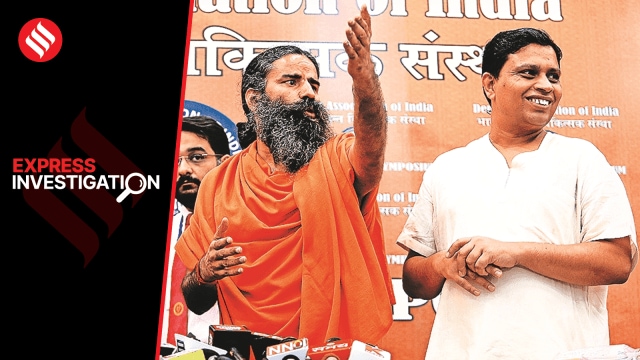All Bidders Were His Own: How Ramdev’s Close Aide Balkrishna Won Uttarakhand’s Showpiece Tourism Project

Image via The Indian Express
Dehradun, September 12, 2025 — A new investigation has put the spotlight on a major tourism project in Uttarakhand. The state government gave the contract to a company linked to Acharya Balkrishna, the billionaire co-founder of Patanjali and a close aide of yoga guru Baba Ramdev.
At first glance, the bidding process looked competitive. Three different companies submitted their bids. But a deeper look reveals something unusual. All three firms were owned, fully or partly, by the same man — Acharya Balkrishna.
This has raised tough questions about transparency, competition, and the use of public resources in one of Uttarakhand’s most ambitious tourism projects.
A Dream Project at George Everest Estate
The project is based at the George Everest Estate, located near Mussoorie. This 142-acre site is named after Sir George Everest, a British surveyor general after whom the world’s tallest peak is also named.
The government wanted to transform this estate into a world-class adventure tourism hub. Plans included parking areas, a helipad, wooden huts, a café, museums, and even an observatory.
The aim was clear: to attract more tourists, improve facilities, and boost Uttarakhand’s image as a major destination for nature and adventure lovers.
How the Bidding Began
The Uttarakhand Tourism Development Board (UTDB) floated the tender in December 2022.
The conditions looked strict. The winning bidder had to pay an annual concession fee of ₹1 crore to the state. They also had to promise that they had not acted in collusion with other bidders. This meant each company had to assure that it was competing independently, without cooperation or coordination with rivals.
By July 2023, the government awarded the contract to Rajas Aerosports and Adventures Pvt Ltd.
The Three Companies
Here are the three companies that entered the race:
- Prakriti Organics India Pvt Ltd
- Owned almost entirely by Balkrishna.
- Held more than 99% stake.
- Bharuwa Agri Science Pvt Ltd
- Also owned more than 99% by Balkrishna.
- Rajas Aerosports and Adventures Pvt Ltd
- At the time of bidding, Balkrishna owned around 25%.
- But after winning the contract, his stake rose to nearly 70%.
- Later, many more of his companies, such as Prakriti Organics, Bharuwa Agri Science, Fit India Organic, and Patanjali Revolution, also became shareholders.
So, in effect, all three bids came from the same family of companies controlled by one man.
The Big Problem: Where Was the Competition?
Tenders are meant to encourage fair competition. The idea is simple: multiple independent companies fight for the same project, and the government chooses the best offer.
But in this case, there was no real competition. Every bidder was tied to the same owner. Even though the paperwork may have looked different, the money and control came back to Balkrishna.
Critics argue this goes against the very spirit of the tender rules. The promise of no collusion seems questionable when all companies are part of the same business empire.
The Government’s Stand
Officials say the process was open. Anyone could have applied, they argue. The tourism board maintains that it cannot stop companies with common shareholders from bidding.
UTDB Deputy Director Amit Lohani explained that the annual fee of ₹1 crore was fixed based on their assessment. He did not see any irregularity in awarding the contract.
The Company’s Defense
A spokesperson for Rajas Aerosports also defended the process. They said that having common investors does not mean the companies act together. According to them, operations and decision-making are separate.
They also highlighted the project’s success. Tourist numbers at the estate have risen sharply. The estate welcomed 2.2 lakh visitors by November 2024. Helicopter rides alone drew 3,402 tourists.
Money Matters
The project has been financially significant.
- Before winning the contract, Rajas Aerosports had a turnover of just ₹1.17 crore in 2022-23.
- After the project started, turnover shot up to ₹9.82 crore in 2023-24.
- Losses also grew, but the revenue jump was massive.
Meanwhile, the state had already spent ₹23.5 crore (mostly from Asian Development Bank loans) to upgrade the estate between 2019 and 2022.
Why This Case Matters
- Use of Public Resources: Large amounts of public money have been used to prepare the site. Now, control rests with one private group.
- Fairness of Bidding: With all bidders tied to Balkrishna, the competition looks hollow. The rules clearly warned against collusion.
- Transparency: Tender documents even allow cancellation if anti-competitive practices are found. But so far, no action has been taken.
- Wider Concerns: If this can happen in one of the state’s most high-profile tourism projects, can the same pattern repeat in other projects?
Broader Plans
The George Everest Estate is part of a bigger dream. The state government has been working on “Himalayan Darshan,” which includes new tourism experiences like air safaris and gyrocopter rides.
The success or failure of this estate project will likely shape the future of those plans.
What Happens Next?
The controversy is far from over.
- Activists and opposition leaders may demand a review of the tender.
- Auditors or courts could step in to examine whether the rules were violated.
- For now, the project continues, with tourists enjoying the new facilities.
Final Word
The George Everest Estate was supposed to be a model of how public-private partnership could boost Uttarakhand tourism. Instead, it has turned into a case study on how powerful business interests can dominate the system.
On paper, the rules were followed. But in reality, the idea of free and fair competition seems lost.
The question remains: should one man’s business empire be allowed to bid against itself for a public project?
Only time — and perhaps a legal review — will tell whether this is seen as smart business or as a breach of trust with the people of Uttarakhand.